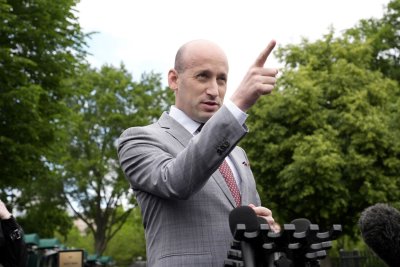
May 9 (UPI) — The Trump administration is “actively looking at” suspending the writ of habeas corpus, which is the right to challenge the legality of a person’s detention by the government, White House senior adviser Stephen Miller said Friday.
Outside the White House, the deputy chief of staff for policy was asked by a reporter whether President Donald Trump was considering suspending the writ of habeas corpus to deal with illegal immigration in the United States.
“Well, the Constitution is clear — and that, of course, is the supreme law of the land — that the privilege of the writ of habeas corpus can be suspended in a time of invasion,” Miller said.
“So, it’s an option we’re actively looking at. Look, a lot of it depends on whether the courts do the right thing or not.”
Miller said judges should stop blocking the deportation of undocumented immigrants in cases in which those people are exercising habeas writs.
One Democratic aide told The Hill that “Stephen Miller is not a lawyer but he plays an (expletive) one on TV. No one in their right mind would take his advice seriously, but sanity is in short supply in this administration.”
The U.S. Constitution, in Article 1, section 9, reads: “The Privilege of the Writ of Habeas Corpus shall not be suspended, unless when in Cases of Rebellion or Invasion the public Safety may require it.”
The writ of habeas corpus has been suspended only four times, according to the National Constitution Center. They were during the Civil War from 1861 to 1865, when parts of South Carolina was overrun by the Ku Klux Klan during Reconstruction in 1871-1872, when two provinces in the Philippines were under unrest in 1905 and in Hawaii after the bombing at Pearl Harbor in 1941.
Supreme Court Associate Justice Amy Coney Barrett and attorney Neal Katyal in 2017 wrote the Constitution “does not specify which branch of government has the authority to suspend the privilege of the writ. But most agree that only Congress can do it.”
On April 7, the Supreme Court, in a 5-4 decision, allowed deportations of alleged members of Venezuela’s Tren de Aragua gang to El Salvador based on the 1798 Alien Enemies Act. But the justices ruled that the government must give deportees “reasonable time” to challenge their removal in court before being deported.
The 1798 Alien Enemies Act has been used three times during wars.
Administration officials didn’t adhere to an oral order from U.S. District Judge James Boasberg in March to turn around or halt flights of Venezuelan migrants headed to the Salvadoran prison.
On Wednesday, U.S. District Court Judge Brian Murphy in Massachusetts said deporting a group of migrants overseas, possibly to Libya and Saudi Arabia, would violate court orders prohibiting the government from shipping deportees to a third country. Murphy was appointed by President Joe Biden.
Also, students, including Rumeysa Ozturk at Tufts and Mahmoud Khalil at Columbia, have challenged their detention. Ozturk on Friday was granted bail by District Judge William Sessions in Vermont, appointed by President Barack Obama.
Miller told reporters the Immigration and Nationality Act in 1965 takes away jurisdiction by the Judicial Branch over immigration cases.
“The courts aren’t just at war with the executive branch, the courts are at war — these radical, rogue judges — with the legislative branch, as well. So all of that will inform the choices the president ultimately makes,” Miller said.
Some men deported said they’re not members of gangs.
“If Donald Trump can sweep non-citizens off the street and fly them to a torturer’s prison in El Salvador with no due process, he can do it to citizens, too,” Rep. Jamie Raskin, of Maryland, the top Democrat on the House Judiciary Committee, said last week. “Because if there is no due process, no fair hearing, you have no opportunity to object.”